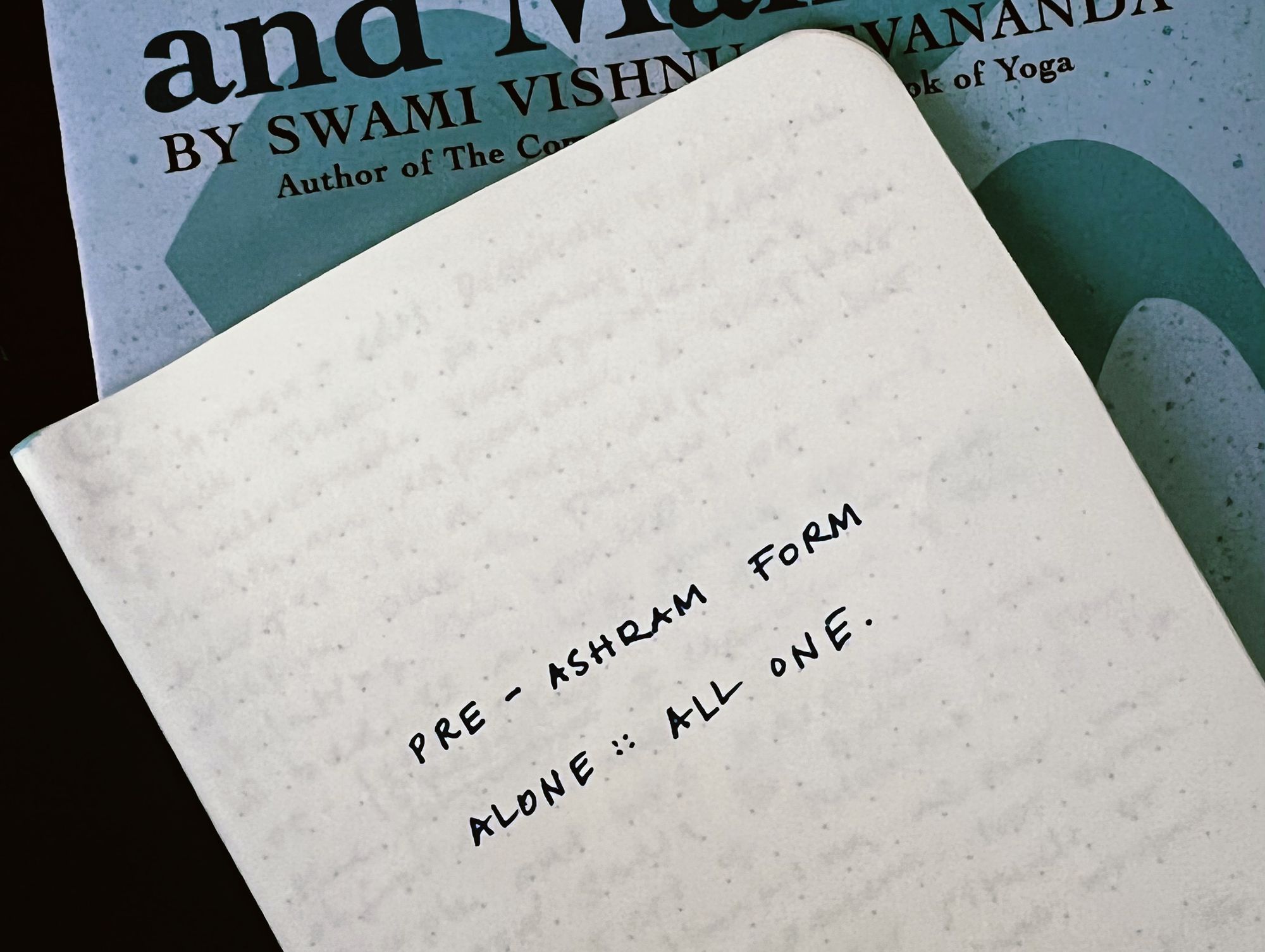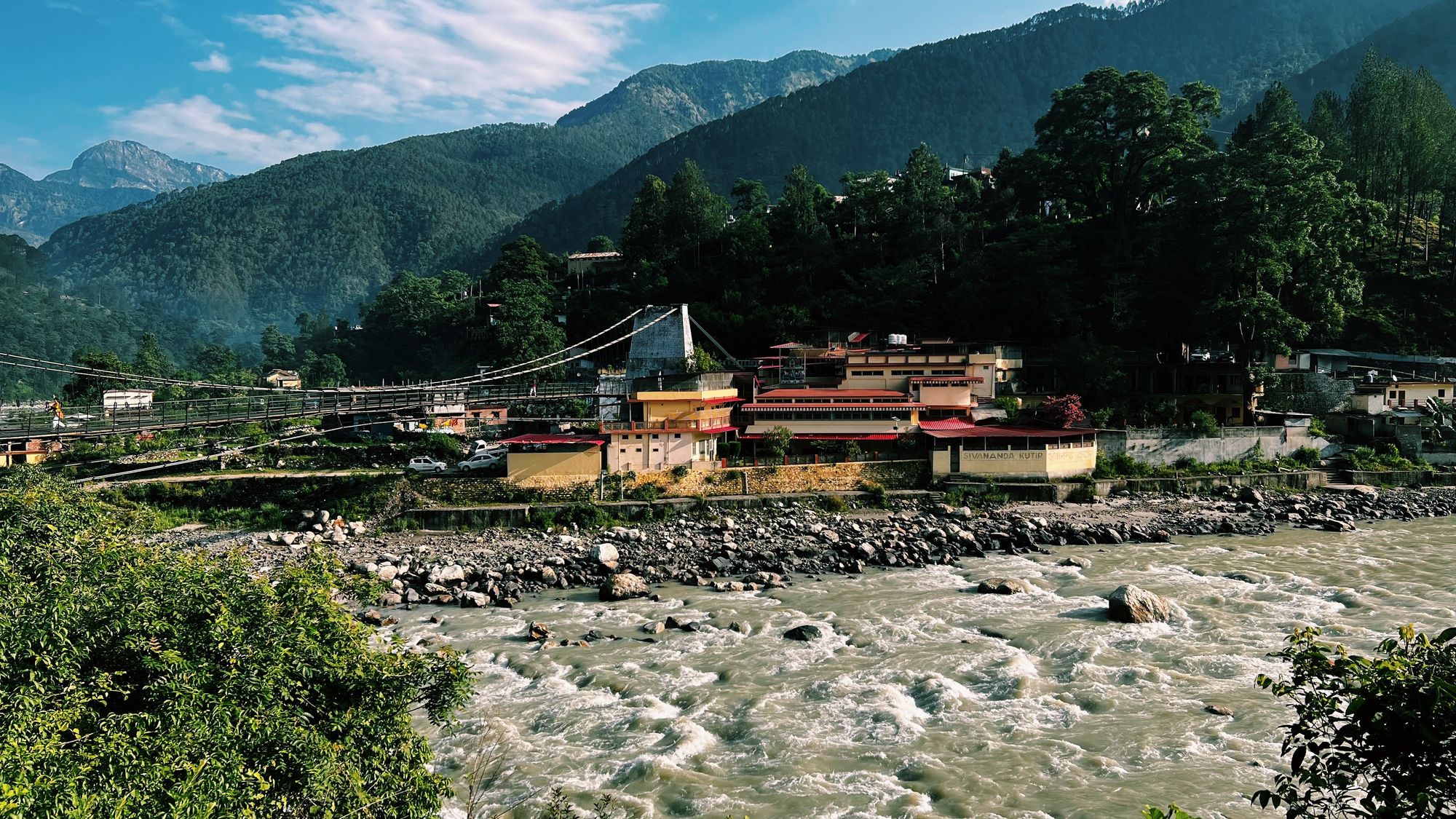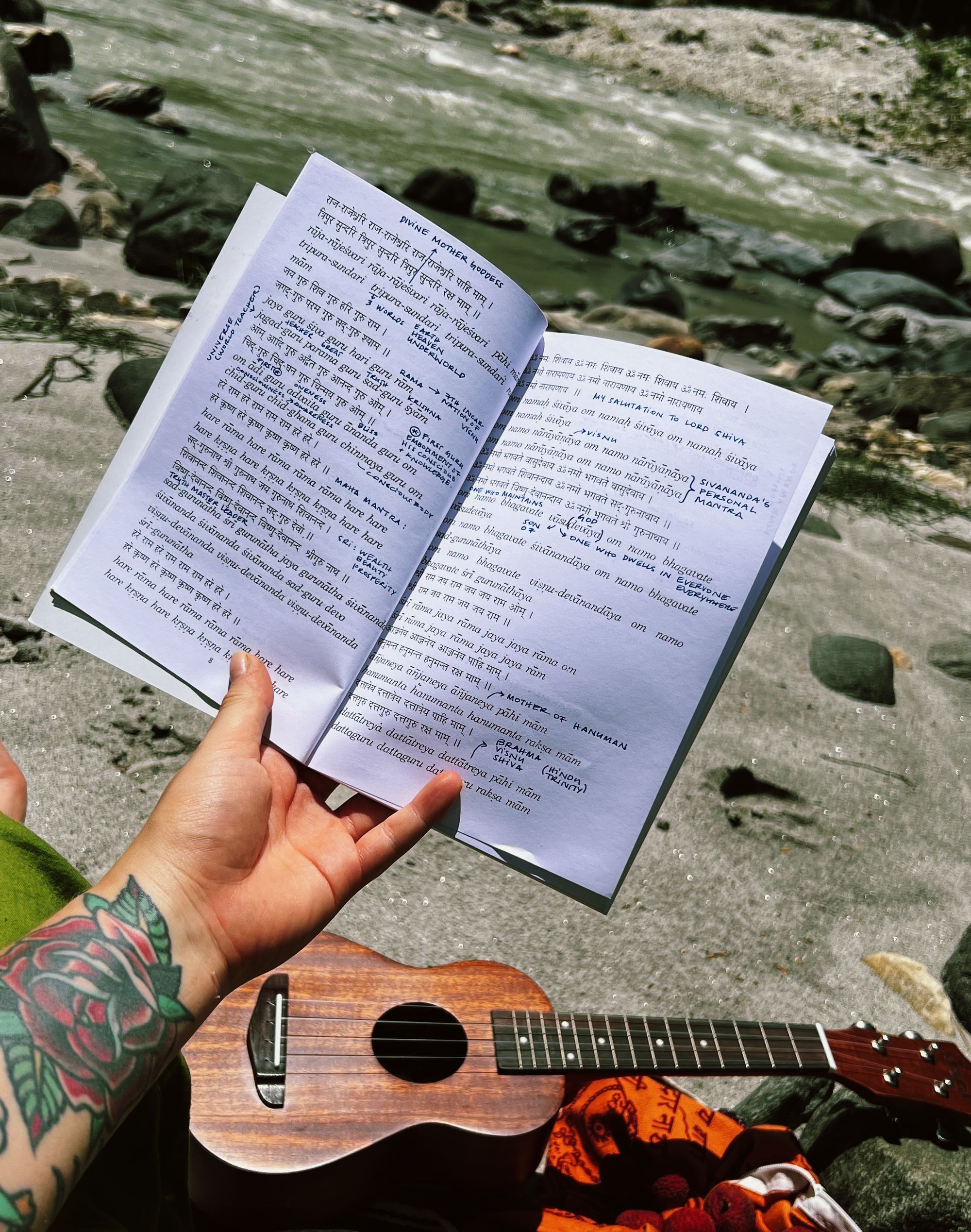3 hours of meditation a day, 2+ hours of asana (yoga) practice, one hour of karma yoga, 2 hours of philosophy classes, infinite hours sitting crossed legged on the floor wearing white pants and a yellow shirt that says "Sivananda Yoga Vedanta Ashram". Chanting hare Krishna hare Rama before meals, celibacy, a yellow book to start your Sadhana (detachment path). Intense breathing exercises, holding headstands for 10 minutes. I ask myself multiple times a day "how the actual fuck did I land here?"
Long story short I ended up in an Ashram in the Indian Himalayas because of a boy I met in Barcelona, a yoga teacher I met in Nepal, and a psychic I met in Rajasthan.

About this Ashram
Sivananda Yoga Vedanta Ashram was founded by Swami Visnudevananda, disciple of Swami Sivananda - one of the most influencial sages of the 20th century. Continuing the lineage of these two yoga masters, Sivananda follows the Gurukula system where students and teachers live together, continuing an ancient teaching lineage (guru parampara) passed down from guru to disciple – a tradition that dates back several thousand years.
Located at the feet of the Ganges river in Netala - a small village in the Himalayas - the ashram teaches traditional Hatha Yoga and Vedanta philosophy.
The energy of a traditional Ashram right next to the Holy Ganges River feels so ancient; when you read the Upanishads, Vedas, Yoga sutras etc, you can vaguely imagine where this knowledge came from. You think man with dreadlocks dressed in orange eating only rice. But when you're actually living here and walking to these caves where these Sadhus (sages) would sit and meditate for years, you can almost visually see the limits of our material world and the beginning of this consciousness universe they discovered through their Sadhana.
Himalayas... fuck! I can't get enough of these mountains.

Day to Day Ashram life
I could write forever about this experience (I kinda am). In this post, I will cover the daily schedule of the Ashram along with information about each class, and the most relevant conclusion I've had in my time here.
(I will be writing more personal conclusions and chronicles when I go back to life on earth)
5am Wake up
At 5:20 am the sound of a huge gong marks the beginning of our day. We wake up and head to the Satsang Hall, all 42 of us dressed in our white pants yellow shirt Sivananda uniforms.
6am Satsang
Satsang means sacred gathering in Sanskrit language, sat meaning "the ideal, pure and true essence" and Sang meaning "association".
The Satsang hall is breathtakingly beautiful, located on the second floor of the Ashram, with big windows overlooking the Holy Ganges, sound of the river flow echoing the whole room. We sit down cross legged and meditate for half an hour. This morning Satsang is lead by Mata Ji (equivalent of Mother, female guru in Sanskrit). A beautiful, luminous woman, wisdom powering through her deep black eyes and soft gaze. You can feel a dawn-infused, feminine liveliness that evolves into a light, earthy meditative state as the mind is still traveling from the dream state into waking, and as the twilight shines through your closed eyes.
This meditation for me feels very dream-like, a sensation of dropping down into the subconscious versus the night Satsang where I feel like I am floating up into the collective conscious, bird's eye view of my Self.
After the meditation we do a short Kirtan (devotional chanting) which is honestly one of my favorite parts of the day. We have a chant book and we sing songs to Hindu deities (Krishna, Ganesha, Rama, Vishnu, Durga, Lakshmi, Saraswati, etc)

8am Morning Asana class
Sivananda teaches traditional Hatha, which is very different from the yoga we know in the west. We say "yoga" referring to yoga postures, but these postures (or asanas) are only a small part of what yoga encompasses. The main goal of practicing asanas and pranayama (breath control) is gaining control over the mind, so we can prepare for meditation and connect with the higher Self.
I'm planning to write a post about Hatha Yoga, leaving this line here to link it later ((self-reminder)).
We practice the traditional Hatha Yoga sequences, 30 minutes of pranayama (breath control exercises) followed by a series of challenging asanas meant to be performed slowly and consciously. Going far beyond mere physical benefits, these asanas are mental exercises in concentration and meditation. Every day the sequence is the same, but it builds up to harder variations every day.
Yoga truly regards the body as a vehicle for the soul towards oneness, or union with the Self – so these asanas are designed to develop not only the body, but they also broaden the mental faculties and the spiritual capacities.
10am brunch
This is one of the aspects of the Ashram that has re-wired my brain. We eat too much. We should eat to live, not live to eat.
We were given a plate and a spoon the first day, and when the 10am gong bangs we bring them to the dining hall, sit on the floor, and wait to be served while we sing "hare krisna hare rama". There's signs that say "please eat in silence". The first day I was like "what the actual fuck?".
This way of eating is so different from the western ways; we are constantly bombarded with stimuli in our day to day lives, and instead of taking our meals as a sacred moment to nourish our bodies, we see it as a social activity, or another distraction; more stimuli. Throughout the day we are constantly eating, which means our body is constantly digesting. All day, our body is utilizing energy to digest food. We have completely lost touch with our body signals and don't know how hunger feels like. When we eat less meals and actually give the body time to fully digest the last meal, our energy goes to other body functions; we start feeling lighter and more energetic (contrary to what the food industry wants you to believe).
We eat two meals a day at the Ashram. They are absolutely delicious and all cooked in a sattvic way (no meat, no onion or garlic, very little fat and salt, at least one raw element to keep blood alkaline). The first days, by the time we had dinner I was starving. After one week, my body is so used to eating less and I can understand what hunger feels like now.
We wash our plates when we finish eating in complete silence, and take them to our room.
11am karma yoga
One of the 4 aspects of the path of yoga is Karma, which means selfless action. Yoga tradition says that through this action where we help everyone around us (humans, animals, planet) we get closer to experiencing oneness.
We got randomly assigned to duties around the Ashram; my duty is to sweep and mop the Asana Hall (yoga hall). I feel so fucking lucky that I get to clean the place for self and Self-worshipping. I put on my headphones and listen to all the DJ sets from the festivals in Berlin that I didn't go this year because I'm out here lOoKinG fOr GoD.
12am Bhagavad Gita class
This class is incredible. The Gita is an ancient scripture that covers ethics and morality in the shape of an Epic. It is the father of the Hero's Journeys.
The book takes place in a war, and Arjuna (the hero) looses his will to fight. The book is a dialogue between Arjuna and Krishna (his charioteer and teacher) about duty, action, and renunciation.
Through these dialogues there are three major themes: knowledge, action and love. Every day we read the scriptures and analyze them. If you read my blog you know how much I love analyzing epics and hero's journeys, so this class is a gift from the universe.
2pm: Vedanta class
My absolute favorite class I've ever taken. Vedanta is one of the most ancient spiritual philosophies, based on the Vedas (the sacred scriptures of India). The term "anta" means conclusion in Sanskrit – simply put, Vedanta is the cumulation of all the conclusions from the Vedas, the last step of one's spiritual journey.
We sit crosslegged in the Satsang hall, and we open our Sivananda Manual: a yellow book that (in my eyes) holds all the answers of life – and a bunch of notes I've been maniacally writing. It is pretty much a philosophy class, based but not limited to Hinduism. Absolutely beautiful, endlessly fascinating.
What I love about this class, and this Ashram in general, is that religion is not important, Oneness is. We don't practice spirituality for God-realization, we practice it to attain Self-realization, which is union with the higher Self with capital S. The Absolute, the Self that transcends the mind-body senses, and the name/form objects.
From Philosophy, to Kundalini and evolution of Prakrti, this class feels like what we should be taught in school. Led by Mata Ji, who again brings her Durga (divine mother nature) spirit into the "classroom".
3pm second asana practice
Where we learn how to teach yoga. Corrections, adjustments, anatomy, physiology. How to build a sequence for beginners, how to teach pranayama and kriyas, etc. I came to this Ashram without any desire of becoming a yoga teacher – I simply wanted to deepen my practice and understand the roots of yoga. But the more I learn about teaching yoga, the more I want to teach yoga for absolute beginners. It is a practice that is making me look at life in such a simple yet deep way, and I feel a calling to teach it to others. Let's see how this idea lands when I'm back on life on earth though.
5pm dinner
The best moment of the day: when the second yoga class is over and I'm hungry as fuck.
After the meal we have almost two hours to chill. This is a beautiful moment – I sleep in a dormitory with seven other girls, and four of us have become really close. We shower and catch up at this time as it is the longest "break" we have during the day. Somedays I go out to the Ganga and sit there and read books or sing. I decided to delete Whatsapp and Instagram for this month and I feel like my mind is going to the most beautiful places. I'll also write a blog post on that later on when I see the full effects.
7:30pm Satsang
Night Satsang. We go to the Satsang hall and we meditate in complete darkness for half an hour. These thirty minutes feel like a minute in this density of darkness, compared to the morning meditation that feels like years, as the room gets lighter and lighter.
Lit by candles and filled with Ganga sounds, the passing of another day at the Ashram becomes invisible as the nowness is all that can be felt in that room, and in all time and space for all we know. Because it feels like we know nothing when we're there – knowledge transcends name and form and becomes pure awareness. At night I see green lights, I emanate green light, I breathe green air, I see an emerald world that I've never had access too, and I feel protected. I try to keep this feeling when I go to sleep.
Satsang ends with Aratis – hindu closing chants. One for the teachers and masters, and one for the Ganga river. We light candles at the altar and bow down to Swami Sivananda and Swamiji Visnudevananda. Collective gratitude also feels like pure loving awareness.
10pm lights out
I've been staying up writing. New levels of curiosity (and euphoria) are being unlocked – I feel so inspired and energized by all these learnings and meditations. Even though I should be sleeping more I feel like all this spiritual work is recharging me. It feels like before I had one of those bootleg phone chargers that you buy on the streets, and now I have the apple one that charges the phone in less than an hour.
So much to write, I think this post is a draft. A published draft, and a work in progress as I link new posts and finish up adding photos. But I want to share as much as I can all these incredible learnings.
The biggest conclusion so far
Through meditation we are capable of understanding the goal of life: the realization of oneness. The meditative state transcends all time limitations. In it there is neither past or future, and the only thing that exists is the I AM in the eternal NOW.
Thank you for coming to my Ted Talk
If you have more questions about the Ashram I will be happy to answer them via my email. As always thank you so much for reading, I am committed to pass these incredible knowledges passed down from guru to guru that will slowly land inside the www in this little corner of the internet called about:/blank.


